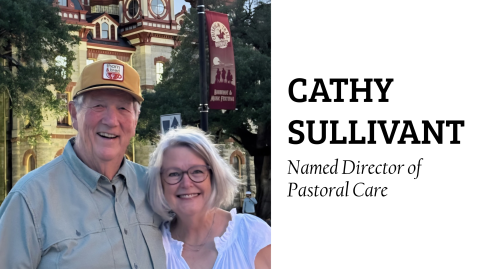TLDR: There is no denying that we are at a dark time in history, and it is easy to lose hope, feel small in the face of global turmoil and economic uncertainty, and wonder whether our faith still has power. Yet God has been faithful in every generation. We are called to endure and get busy. Read on for more.
This week’s Gospel from Luke 21:5-19 keeps Jesus in the Temple. Just days before this story, he has faced three public tests from the religious and political elites: A question about his authority, a question about paying taxes to Caesar, and a question about marriage in the Resurrection. These were attempts to trap him in some offense against God or Rome that might get him arrested. After these confrontations, Jesus finally turns to teach his disciples, and what he teaches them begins with something small and easily overlooked.
In Luke 21:1-4, Jesus notices a poor widow slipping two copper coins into the Temple treasury. She gives quietly, almost embarrassed, offering the little she has to live on. In contrast, the wealthy make a show of their gifts, heavy coins dropped loudly, accompanied by equally heavy boasting. And yet, Jesus says the widow “put in more” because she gave everything she had to live on. From that tiny act of devotion, the disciples shift their gaze to the grandeur of the Temple itself. It was, to them, the most magnificent structure they had ever seen. They marvel at its enormous columns and dazzling adornments, offerings given “to God.” But Jesus responds with a shocking prophecy:
“The days will come when not one stone will be left on another; all will be thrown down.”
This prophesy invites us into an interplay of three different historical horizons. Imagine, if you will, a photographer with three camera lenses. One focuses on the year 30 CE when Jesus uttered the prophesy, the second focuses on the year 80 CE, when Luke wrote his Gospel, and the third focuses on our own time (the modern-day hearers of the prophesy).
- The Horizon of the Year 30: Jesus’ Prophecy
When Jesus uttered these words, the Temple stood as the center of Jewish religious, cultural, and political life. To imagine it destroyed was unthinkable. Yet Jesus foresaw a day when the grandeur of the Temple and the pride of the people would crumble. Within forty years, around the year 70, Jerusalem fell and Rome reduced the Temple to rubble in a matter of days. Yet we must look at this prophesy (mighty structures coming down) in light of the story that came before. A poor widow is elevated (praised) for her generosity and her faith. This is Luke’s trademark style. God raises the lowly from their state and brings down the mighty (people and structures) from their thrones. The faith and perseverance of the frightened small group of apostles and disciples will be elevated and rewarded. Persecution will come, but God will vindicate those who suffer. This is a needed message just before their beloved Messiah is arrested and killed. It is the hope of this vindication that fueled the community’s faith and endurance. Christ will die, but he will not leave them orphaned or abandoned.
- The Horizon of the Year 80: Luke’s Community
Luke writes his Gospel around the year 80, more than a decade after the Temple’s destruction. Two generations had passed since Jesus’ resurrection, and the early Church was wrestling with several crises:
Disappointment and Delay: Christians had expected the imminent return of the Messiah. The Apostle Paul puts it this way in 1 Thessalonians 4:13-18, “We who are alive, who are left, will be caught up in the clouds together with them (who have died in the Lord) to meet the Lord in the air, and so we will be with the Lord forever.” But fifty years had passed since the dead and resurrection of Jesus. Some believers had already died waiting. False messiahs had already appeared saying, “I am he” and “The time is near.” Luke reminds his community that Jesus predicted all of this and warned, “Do not go after them.”
Persecution and Fear: Luke’s community had suffered arrests, torture, forced betrayals within families, and even death. Again, Luke recalls Jesus’ words: “They will arrest you… you will be brought before kings… This will give you an opportunity to testify.” Even in suffering, Jesus promises a sustaining wisdom, a courage not of their own making: “I will give you words and a wisdom…”
Despite martyrdom, the Church was growing. Although they could be killed and their bodies could be destroyed, Jesus promised that “not a hair of your head will perish.” This sounds a bit confusing. How could those who die not perish? Perishing in this context means dying outside of the family of the Lord. But those who die in the Lord will save their souls. Their hope and their future in God’s kingdom will remain secure.
It is important and necessary for Luke to write this story at this point in his community’s history. This is an invitation to endurance and faith. Christ will return soon enough and those who endure to the end will receive the inheritance promised. Their sufferings will be vindicated. Their endurance and faithfulness will be rewarded. They just need to hold on and trust in God and their beloved Messiah. This reminds me of Paul’s exhortation in Romans 8:18, “I consider that the sufferings of this present time are not worth comparing with the glory about to be revealed to us.”
- The Horizon of Today: Our Own Time
So what do these ancient prophecies say to us in the 21st century? We live in a world shaped by Jesus’ words: Nations rise against nations. Earthquakes and fires and storms dominate the news. Food insecurity grows with over forty million Americans dependent on food stamps and the lines of the homeless growing every day. Political instability shakes institutions, and we see politicians on television and social media degrading their opponents with words like “fat, ugly, lazy, etc.” The gap between rich and poor widens at a breathtaking pace, shrinking the Middle Class to terrifying lows. Many of us look at our world and whisper the same question Luke’s community asked: “How long? Will Christ ever return to right the wrongs of this world?”
There is no denying that we are at a dark time in history, and it is easy to lose hope. Easy to feel small in the face of global turmoil and economic uncertainty. Easy to wonder whether our faith still has power. But we must not forget that we have been here before. Our nation has been divided before. We have suffered high unemployment rates and the breakdown of social institutions before. Yet God has been faithful in every generation. Crisis after crisis, God has provided the means for us to advance to a new reality. Luke’s Message for us today is simple and powerful: Endure and get busy. His reminder is as urgent now as it was then: God is in charge of history and those who endure will receive their reward.
How do we endure? What do we do while we wait? We do what generations of Christians before us have done at times of uncertainty, we get busy. We are not called to passive longing for Messiah’s return. We are called to kingdom work, the work Jesus began in the world: feeding the hungry, clothing the poor, visiting the sick, fighting for justice for the voiceless, comforting the lonely, and encouraging one another to love and good works. The kingdom that is coming is already breaking in, and we can find God in our own story if we pay attention. No one knows when the end will come, but we cannot wait for the end to begin living as citizens of God’s kingdom. We must become each other’s safety net, waiting together, working together, hoping together. Our current sufferings are real, but as Paul said, they are “not worthy to be compared with the glory that will be revealed to us.” God is on the move, and our final vindication is near.
Until then, may the Lord continue to strengthen our faith and rekindle our hope.
Blessings to all, Fr. Roman+





